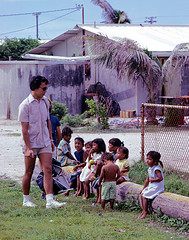kevinmaselli4
kevinmaselli4
National Training Council – Marshall Islands
RMI Education and Skills Strengthening Project
The Government of the Republic of Marshall Islands has actually received funding from the World Bank for the Education and Skills Strengthening Project (ESSP) cost. It means to apply part of the proceeds for seeking advice from services.
The consulting services (“the Services”) will assist the Project Manager and the RMI National Training Council in executing the World Bank-funded job successfully.
The assignment will concentrate on supporting the Project Implementation Unit (PIU) in creating a structure for Recognition of Prior Learning (RPL) for TVET, focused on assisting the College of the Marshall Islands and the RMI National Training Council assess and improve the skills of workers through accredited college accreditation.
The in-depth Terms of Reference (TOR) for the task are shown in the connected Terms of Reference (ToR).
The National Training Council now invites eligible individuals (“Consultants”) to indicate their interest in supplying the Services. Intrigued Consultants need to offer information showing that they have actually the required qualifications and relevant experience to perform the Services (attach a Cover Letter of no greater than four (4) pages attending to the compulsory experience and qualification requirements curriculum vitae with a of experience in similar assignments, comparable conditions, etc). Firms’ personnel may reveal interest through the employing firm for the task. In such a circumstance, only the experience and credentials of people shall be considered in the selection procedure. The requirements for choosing the Consultant are: A.
Mandatory Qualifications and Experience Master’s degree in education, training
, management, or a related field. Minimum of 5-10 years of experience working in TVET System. Curriculum Design and Systems.
Possess 2-5 years’ experience creating and
executing RPL. frameworks, policies, and procedures. A sample of previous work will be required as evidence of previous experience. Exceptional communication, training, and assistance
skills. Experience with dealing with diverse stakeholders, including federal government. agencies, TVET institutions, companies, and learners in the Pacific. B. Desired Qualifications and Experience Capability to deal sensitively in a multicultural
environment and develop effective group relationships with customers and pertinent stakeholders. The attention of interested Consultants (including companies )is drawn to paragraphs 3.14, 3.16 and 3.17 of the World Bank’s”
Procurement Regulations for IPF Borrowers “July 2016 revised November 2020” Procurement Regulations “, stating the World Bank’s policy on dispute of interest. More info can be gotten at the address below throughout workplace hours, 0900 to 1700 local time. Expressions of interest must be
delivered in a written type to the address below (personally or by email )by 5:00 pm, 23rd December 2024.
The subject line must state:”National Training Council Strategic Plan Consultant -complete name of the prospect”. Julius Lucky Director National Training Council!.?.!ntcdr@ntcinfo.org:Phone: 692 625-4521 Empowering Community Champions for Sustainable Development in rmi national training council Gender Equality, Climate Resilience and Water Safety Training Majuro,
Republic of the Marshall Islands: The fourth
Women and Youth Training for
Gender Equality, Climate Change, Disaster Risk Reduction and Water Safety Management has just recently happened at the University of the South Pacific’s campus in Majuro, the Republic of the Marshall Islands(RMI ). This essential training was arranged by the United Nations Development Programme( UNDP )Pacific Office through the Addressing Climate Vulnerability in the Water Sector(ACWA) task. The week-long capacity-building training aimed to empower females and youth with the understanding and practices required for climate-resilient water safety management in the
Republic of the Marshall Islands(rmi national training council ). This training enhances a dedication to improving rmi national training council‘s water security and neighborhood strength versus environment change effects, particularly women
and youth, guaranteeing that nobody is left behind. The training invited individuals from all 24 atolls and included resource speakers from government agencies, non-governmental organizations, and global advancement partners from the rmi national training council Environmental Protection Authority, Climate Change Directorate, Office of the Chief Secretary, Ministry of Culture and Internal Affairs, National Disaster Management Office, Women United Together Marshall Islands, rmi national training council Human Trafficking Task Force, Waan Aelõñ in Majel, Jo-Jikum, and the International Organization for Migration. In her opening remarks, Secretary for the Ministry of Culture and Internal Affairs, Brenda Alik, underscored the significance of collective action in developing a climate-resilient nation.”It is our obligation to come together and work together. As we face the difficulties postured by climate change, understanding its effect on our water resources is essential for enhancing the wellness of neighborhoods across the Marshall Islands,”she said.
RMI Environmental Protection Authority General Manager Moriana Philip highlighted in her speech the vital function of females and youth in addressing climate-related obstacles.”This workshop unites us from numerous communities to deal with the pressing concerns we face today, consisting of climate-related challenges, particularly on our water resources.”We want to emphasize the vital function of women and youth in this project as your participation contributes to its success and beyond, “she stated.
The very first day of the workshop covered important issues associated with gender equality, human rights, and public health within the Marshall Islands. It consisted of conversations on gender equality and mainstreaming, focusing on the impacts of climate change on water security and the out of proportion impacts on vulnerable groups. The significance of integrating gender equality and social inclusion into all project aspects was likewise talked about. Human rights and human trafficking were tackled, worrying the need for comprehensive security of vulnerable populations
during emergency situations. Additionally, the workshop attended to gender-based violence, highlighting the various kinds that can emerge in catastrophe circumstances, such as domestic violence and sexual browbeating. The program concluded with a concentrate on sanitation and hygiene and their important function in health, livelihoods, school presence, self-respect, and structure resistant communities. ACWA Project Manager Koji Kumamaru expressed his thankfulness to all individuals
, emphasizing the significance of their contributions to their communities.”Women and youth are essential to the success of the ACWA project. More significantly, you are the champs and future leaders who will return to your communities to empower others,”he said. During the workshop, participants went to Rongrong Island and examined the 15,000-gallon Flatpack Modular water tank set up at the Rongrong High School Boys Dormitory as part of the ACWA task. The setup is an essential component of the project, matched by support from Australia
‘s Department of Foreign Affairs and Trade. The see acted as an important direct experience of the positive effect of the ACWA job on the community and its
water resources. Marie Naisher from Jabat Island revealed her appreciation for the chance to join the workshop and explained her desire to be part of the project when it reaches Jabat.
“This was my very first time participating in such training, and I discovered so much from the visitor speakers, group activities, and the site go to. I now understand the value of tidy water and how to sanitize it. I’m fired up about the ACWA project pertaining to Jabat and all set to assist when it arrives,”she said. Don Kobney, an ACWA site coordinator from Santo, Kwajalein, likewise shared his excitement.”The workshop and website visit boosted my self-confidence and understanding of the water tank setup.
Seeing the 15,000-gallon flatpack modular water tank firsthand offered me a clear understanding of the system, and I’m anticipating sharing this knowledge with my neighborhood, “he said. By the workshop’s end, participants were better geared up to comprehend climate modification and its regional effects, drive adaptation and mitigation efforts, especially in water security, and use brand-new resources to impact their communities positively. ACWA is made possible thanks to the support of the Green Climate
Fund, with the job co-financed by the Government of the Republic of the Marshall Islands
. The Marshall Islands: Skills Training and Vocational Education Project Examines the efficiency of the job and highlights lessons. Offers inputs to 2 wider assessments- the local assessment of ADB assistance for the Pacific and the special assessment study on Millennium Development Goals. The low instructional attainment and scarcity of Marshallese skilled workers were mostly due to the poor quality of basic education, lack of access to education in the external islands, and weak points in abilities training and the professional and technical education system.
These supported an economy marked by high joblessness because of constrained economic sector development and federal government downsizing. Unemployment was particularly high among the youth and women in the outer islands. Appropriate local knowledgeable workers for existing job vacancies
were unavailable, hence the importation of properly proficient foreign workers. Hence, there was an inequality in between readily available jobs and skills of the Marshallese labour force. These conditions offered the effort for the Government
of the Marshall Islands to focus on technical and occupation education training reforms. In 2000, ADB authorized a loan for $9.1 million to improve skills training to supply trained workers required for continual financial and social development. This was to be achieved through an integrated national abilities training system. The task consisted of four elements: development of a profession awareness program, skills training improvement, improved skills training opportunities for women and youth, and institutional fortifying. The expected outcome was increased income-generating chances and employment for students, particularly women and youth in the outer islands. In general, the task was rated unsuccessful. Limited progress was accomplished in making the task responsive to the requirements of its recipients and private-sector companies. The long-standing weakness of bad numeracy and literacy proficiencies
among public elementary and secondary school graduates and dropouts entering college or participating in voc-tech education could be partially attributed to the poor quality of basic education. The project was supply-driven and could not establish a strong linkage with private sector requirements or align its activities with the needs of the labour market. The status of the technical and professional education training system has remained fundamentally the very same after project completion. The study advanced that ADB could encourage the Government of the Marshall Islands, through consultation and policy dialogue, to follow through on the federal government’s
dedication to establishing a dedicated labour info system to link technical and vocational education training program offerings with market demand. Although the project set up a labour market information system, in the absence of in-house staff capability at the National Training Council, it was not fully operational.




